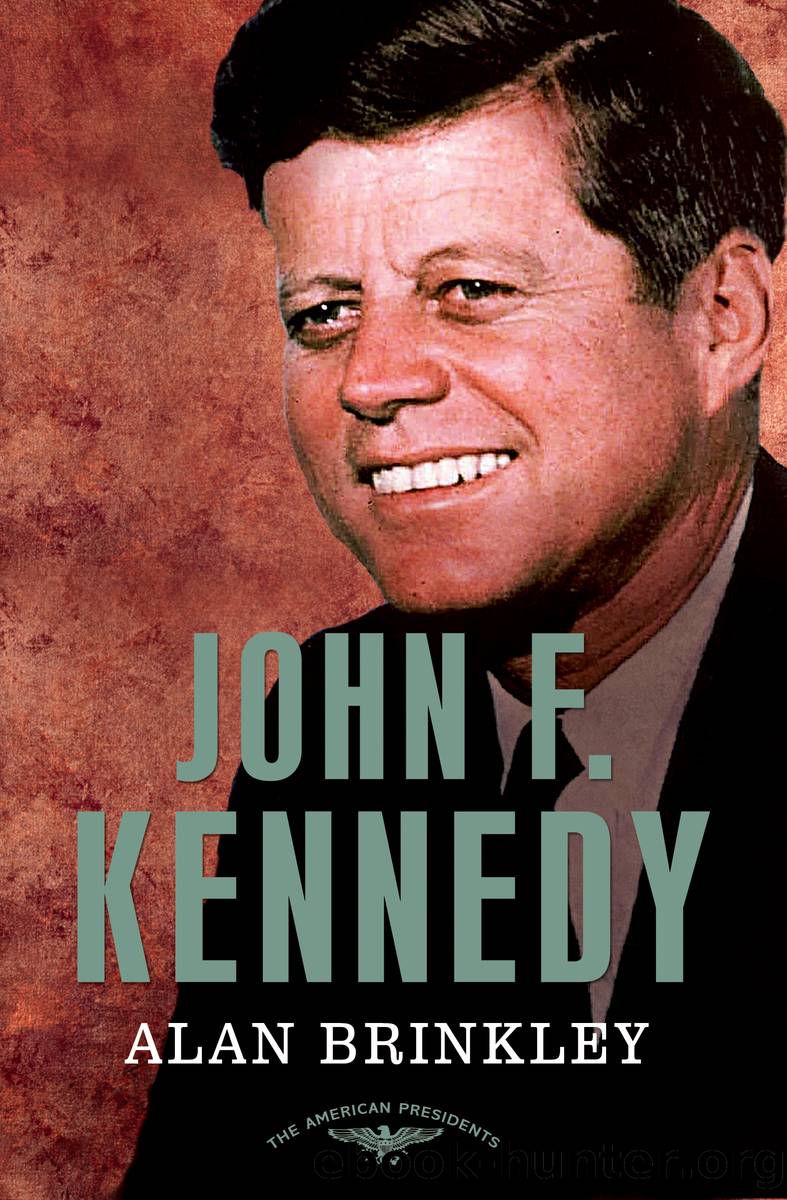John F. Kennedy by Alan Brinkley

Author:Alan Brinkley
Language: eng
Format: epub
Publisher: Henry Holt and Co.
7
The Evolving Cold War
The Kennedys could not get untangled from Cuba. The Bay of Pigs disaster followed them for years. Covert operators continued to seek ways to overthrow the Castro regime. (Lyndon Johnson later said that the Kennedys âhad been operating a god-damned Murder Inc. in the Caribbean.â)1 Of more concern to President Kennedy was the growing alliance between the Soviets and the Cubans; the Soviets were now providing Cuba, according to CIA memos, with âlarge quantities of transportation, electronic and construction equipment ⦠possible limited quantity weapons.â2 The battle of Cuba had never stopped.
Despite the buildup in Cuba, Kennedyâs concerns remained at a relatively low level. âThe major danger is the Soviet Union with missiles and warheads, not Cuba,â he said privately.3 The Justice Department warned that a blockade of commerce would be illegal under international law. In a September press conference, Kennedy described Cuba as a country âin trouble ⦠increasingly isolated from this hemisphere. [Castroâs] name no longer inspires the same fear or following in other Latin American countries.â4 And so Kennedy and most of his advisers continued to believe that the Soviet military buildup in Cuba was modest and entirely defensive. (An exception was John McCone, the CIA director, who warned the president that the Soviet shipments could only mean they were planning offensive weapons.)5
Members of Congress were also becoming alarmed by the presence of Soviet weapons in Cuba, and pressure for action was growing from the press and the public. There were rising calls for a blockade of Cuba. Kennedy resisted. âItâs an act of war,â he said, even though he had considered a blockade himself not long before. âThereâs no evidence that it would bring Castro down for many, many months. Youâd have a food situation in which youâd have people starving.â6 Kennedyâs focus was still primarily on Berlin, but he agreed to call up 150,000 reserve soldiers near the Florida coast in case events in Cuba became more dangerous. But Kennedy still considered the placement of offensive weapons in Cuba to be unlikely, and he left Washington for a long and grueling midterm campaign trip through the Northeast and Middle West for almost two weeks in October.7
In response to the growing anxiety in Congress, the president approved sending U-2 flights over Cuba to photograph the weapons that the Soviets were bringing into the country. Kennedy felt certain that the surveillance would confirm that the buildup in Cuba was entirely defensive. But after the first reconnaissance flight on October 14, and after the photographs were processed the next day, there was clear evidence that the Soviets were indeed placing offensive missiles in Cuba. The missiles had a range capable of reaching much of the United States, and it appeared almost certain that nuclear warheads were either already in Cuba or soon to arrive. Bundy, who worried about Kennedyâs exhaustion from his campaign trip, waited until the following morning, October 16, to give him the news. The president quickly assembled a group of aides and military men to respond to the sudden crisis.
Download
This site does not store any files on its server. We only index and link to content provided by other sites. Please contact the content providers to delete copyright contents if any and email us, we'll remove relevant links or contents immediately.
| U.K. Prime Ministers | U.S. Presidents |
Waking Up in Heaven: A True Story of Brokenness, Heaven, and Life Again by McVea Crystal & Tresniowski Alex(37811)
Empire of the Sikhs by Patwant Singh(23086)
We're Going to Need More Wine by Gabrielle Union(19046)
Hans Sturm: A Soldier's Odyssey on the Eastern Front by Gordon Williamson(18592)
Leonardo da Vinci by Walter Isaacson(13336)
The Radium Girls by Kate Moore(12028)
Tools of Titans by Timothy Ferriss(8396)
Educated by Tara Westover(8054)
How to Be a Bawse: A Guide to Conquering Life by Lilly Singh(7486)
Permanent Record by Edward Snowden(5847)
The Last Black Unicorn by Tiffany Haddish(5635)
The Rise and Fall of Senator Joe McCarthy by James Cross Giblin(5280)
Promise Me, Dad by Joe Biden(5153)
The Wind in My Hair by Masih Alinejad(5095)
A Higher Loyalty: Truth, Lies, and Leadership by James Comey(4964)
The Crown by Robert Lacey(4817)
The Iron Duke by The Iron Duke(4356)
Joan of Arc by Mary Gordon(4110)
Stalin by Stephen Kotkin(3965)
